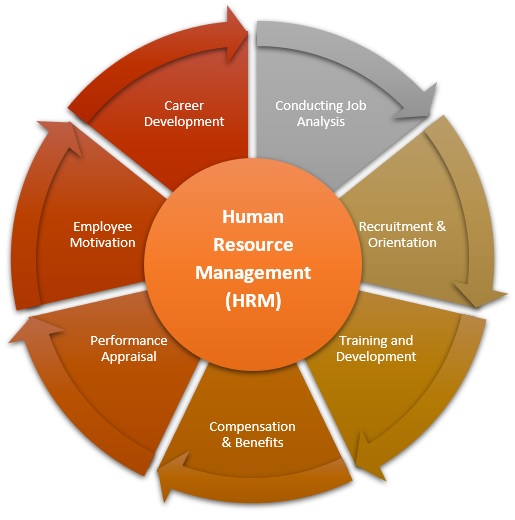- Business Concepts ›
- Human Resources (HR) ›
- Human Resource Management (HRM)
Human Resource Management (HRM)
Definition & Importance
This article covers meaning & overview of Human Resource Management (HRM) from HRM perspective.
What is meant by Human Resource Management (HRM)?
Human Resource Management (HRM) is the process of recruiting, training, compensating and appraising employees, and attending to their labor relations, safety and health and fairness concerns. HRM is a comprehensive set of management tasks and activities, which involves recruiting, developing and maintaining workforce, in ways that contribute to the overall organizational performance.
HRM is sometime classified as Hard HRM and Soft HRM. Aligning strategic goals of the business along with the human resources is known as Strategic Human Resource Management (SHRM).
Functions of Human Resource Management (HRM)

The important objectives and functions of HRM in business are:
1. Conducting job analysis
2. Planning labor needs and recruiting accordingly by different methods of recruitment
3. Selecting suitable candidates from the pool of candidates created through recruitment
4. Orientation and training of the hired employees
5. Training and development
6. Compensation & benefits of employees
7. Performance appraisal process
8. Building employee motivation & commitment
9. Career development and management
Read More
Evolution of Human Resource Management (HRM)
As giant businesses like Ford Motor Company (1903), General Motors (1908) etc., expanded rapidly, they obviously needed to hire more and more employees. B.F. Goodrich was the first company to establish a corporate employment department to deal with employee concerns in 1900. Increasing work and production lead to an increase in the workforce, thereby companies started hiring new employees through newly created specialized units. Ford, for example, called this unit as the employee department. Apart from hiring, these departments also started to manage the existing workforce.
Emergence and growth of labor unions and Fair Labor Standards Act, 1938 and National Labor Relations Act, 1935, made it necessary for these businesses to have one or more managers to represent the interests of the business to organized labor and to administer the emerging set of laws and regulations that governed labor practices.
Importance of Human Resource Management (HRM)
Human resource management or HRM is extremely important in business today. It is important for employee management and ensuring the entire workforce works together. The main importance of HRM in business is:
1. Hire the best suitable candidate for the job
2. Low turnover
3. Have your employees believe that their salaries are fair relative to others in the organization
4. Have people doing their best
5. Comply to all the labor laws
6. To not waste time and money on repetitive interviews
7. To not have your company taken to court because of discriminatory actions
Hence, this concludes the definition of Human Resource Management (HRM) along with its overview.
This article has been researched & authored by the Business Concepts Team which comprises of MBA students, management professionals, and industry experts. It has been reviewed & published by the MBA Skool Team. The content on MBA Skool has been created for educational & academic purpose only.
Browse the definition and meaning of more similar terms. The Management Dictionary covers over 1800 business concepts from 5 categories.
Continue Reading:
What is MBA Skool?About Us
MBA Skool is a Knowledge Resource for Management Students, Aspirants & Professionals.
Business Courses
Quizzes & Skills
Quizzes test your expertise in business and Skill tests evaluate your management traits
Related Content
All Business Sections
Write for Us